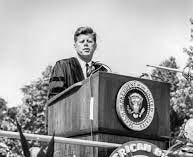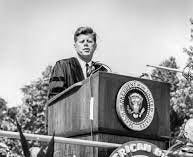We now know most of what happened on that dark day of November 22, sixty-one years ago. After many years of competing theories, we now have solid evidence that the assassination of President John F. Kennedy was planned and carried out by the CIA, in retaliation for the peace project of JFK’s short-lived presidency. Kennedy’s project for peace included peace initiatives with respect to Russia, Vietnam, and Cuba; sustained private dialogue with Nikita Khrushchev; the signing of a nuclear test ban treaty as a first step toward complete disarmament, sustained through the development of institutions of cooperation in commerce and science; and support for and cooperation with Sukarno and the emerging Non-Aligned Movement.
We now know these important facts of American history as a result of the 2008 book by James Douglass, JFK and the Unspeakable, which presents the hypothesis that the CIA …



